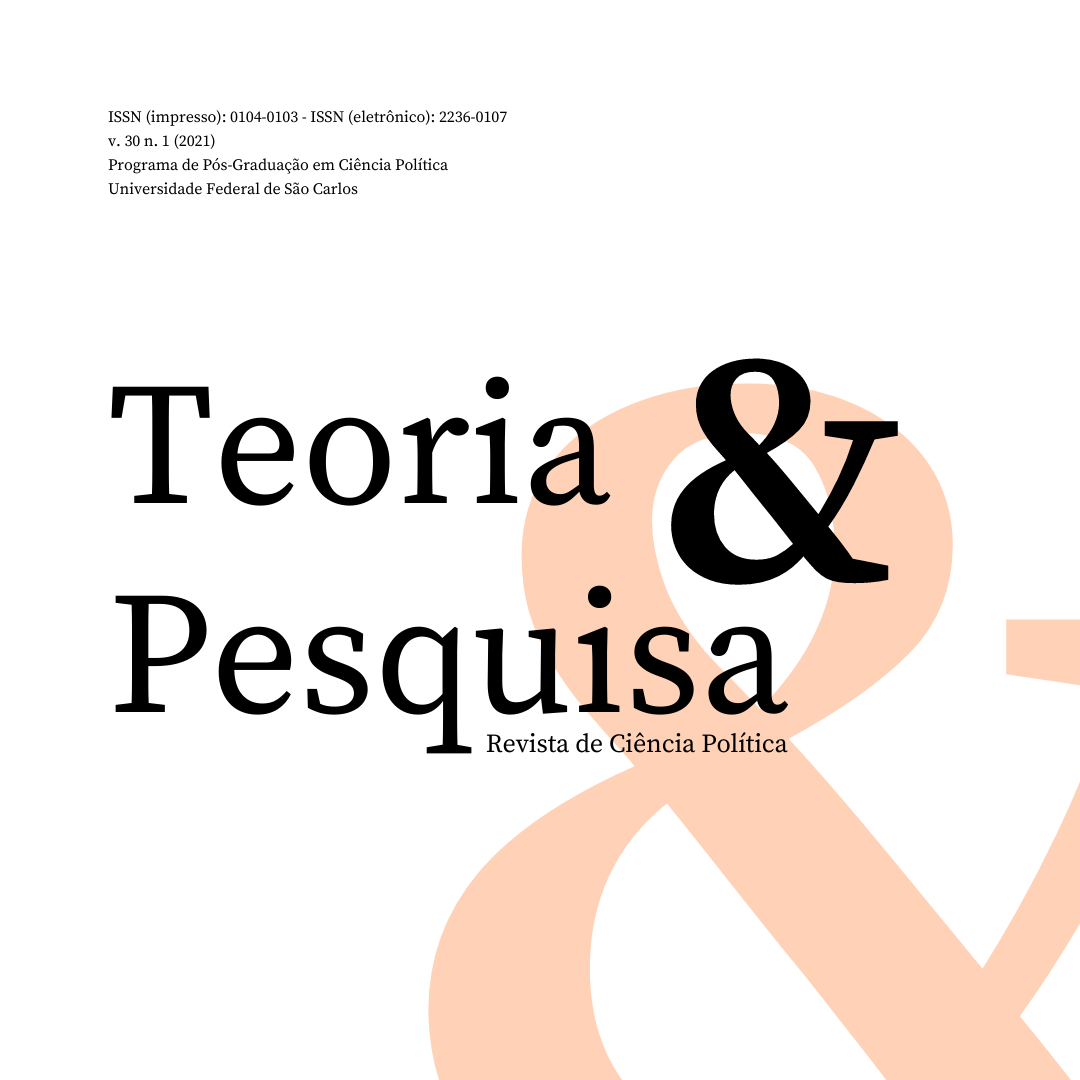POLICY FEEDBACK
O ARGUMENTO FUNDANTE DO NEOINSTITUCIONALISMO HISTÓRICO
DOI:
https://doi.org/10.4322/tp.30104Resumo
Este artigo examina a ideia segundo a qual “a política pública faz a
política”, ou “policies make politics”. Procuro situá-la no debate teórico e
demonstrar como ela rejeita premissas da formulação behaviorista e
questiona o modelo clássico de Harold Lasswell e David Easton. A teorização
sobre o policy feedback se desenvolve até o ponto de respaldar uma literatura
seminal da análise de políticas, tornando-se o argumento fundante do campo
do neoinstitucionalismo histórico. Mostro que, em um primeiro momento, o
mecanismo do feedback ganha contornos mais nítidos sob o ponto de vista
dos órgãos administrativos do Estado, afetando suas capacidades,
aprendizagens e encaixes com atores não estatais. Posteriormente, Paul
Pierson amplifica o escopo, evidenciando que o papel que políticas exercem
como recursos, incentivos e fontes de informação não está restrito às elites
governamentais e aos grupos de interesse, mas pode se estender também ao
comportamento do eleitorado em geral. A discussão apresentada articula
conceitos-chave da análise de políticas, realça as nuances internas do campo
e lança luz sobre como as teorias e seus ganhos analíticos se desenvolveram
historicamente.
Downloads
Referências
Allan, James e Scruggs, Lyle. 2004. Political Partisanship and Welfare State Reform in Advanced Industrial Societies. American Journal of Political Science, 48(3): 496-512.
Arretche, Marta. 1996. Emergência e desenvolvimento do Welfare State: teorias explicativas. Boletim Informativo e Bibliográfico de Ciências Sociais, 3-40.
___________. 2018. Democracia e redução da desigualdade: a inclusão dos outsiders. Revista Brasileira de Ciências Sociais, 33(96): 1-12.
Arthur, Brian. 1988. Self-Reinforcing Mechanisms in Economics. In P. W. Anderson, K. J. Arrow, e D. Pines (orgs.), The Economy as an Evolving Complex System, 5: 9-31.
___________. 1989. Competing Technologies, Increasing Returns, and Lock-In by Historical Events. Economic Journal, 99: 116-31.
Bachrach, Peter e Baratz, Morton. 1962. Two Faces of Power. American Political Science Review, 56(4): 947-952.
Bachrach, Peter e Baratz, Morton. 1963. Decisions and non-decisions: an analytical framework. American Political Science Review, 57(3): 632-642.
Campbell, Andrea Louise. 2003. How Policies Make Citizens: Senior Political Activism and the American Welfare State (Vol. 126). Princeton University Press.
Cohen, Michael e March, James e Olsen, Johan. 1972. A Garbage Can Model of Organization Choice. Administrative Science Quarterly, 17: 1-25.
Downs, Anthony. 1957. An Economic Theory of Democracy. New York: Harper.
Easton, David. 1957. An approach to the analysis of Political Systems. World Politics, 9(3): 383-400.
Esping-Andersen, Gøsta. 1985. Politics against Markets: The Social Democratic Road to Power. Princeton: Princeton University Press, 4877.
___________. 1990. The Three Worlds of Welfare Capitalism. Princeton: Princeton University Press.
Fiorina, Morris e Abrams, Samuel. 2009. Disconnect: The Breakdown of Representation in American Politics. Norman: University of Oklahoma Press.
Giger, Nathalia e Nelson, Moira. 2013. The welfare state or the economy? Preferences, constituencies, and strategies for retrenchment. European Sociological Review, 29(5): 1083-1094.
Hacker, Jacob e Pierson, Paul. 2014. After the “Master Theory”: Downs, Schattschneider, and the Rebirth of Policy-Focused Analysis. Perspectives on Politics, 643-662.
Hall, Peter. 1986. Governing the Economy. The politics of state intervention in Britain and France. Oxford: Oxford University Press.
___________. 1989. The Political Power of Economic Ideas: Keynesianism across Nations. Princeton University Press.
Heclo, Hugh. 1974. Modern Social Politics in Britain and Sweden. New Haven: Yale University Press.
Holland, Alisha. 2018. Diminished Expectations: Redistributive Preferences in Truncated Welfare States. World Politics, 70(4), 555-594.
Huber, Evelyne. Ragin, Charles e Stephens, John. 1993. Social Democracy, Christian Democracy, Constitutional Structure, and the Welfare State. American Journal of Sociology, 99(3): 711-749.
Immergut, Ellen. 1998. The theoretical core of the new institutionalism. Politics & Society, 26(1): 5-34.
Kahneman, David e Tversky, Amos. 1979. Prospect Theory: An Analysis of Decision under Risk. Econometrica, 47(2): 263-292.
Kjellberg, Francesco. 1977. Do policies (really) determine politics? And eventually how?. Policy Studies Journal, 5, 554.
Korpi, Walter. 1985. The Democratic Class Struggle. London: Routledge.
Korpi, Walter e Palme, Joakim. 2003. New Politics and Class Politics in the Context of Austerity and Globalization: Welfare State Regress in 18 Countries, 1975-1995. American Political Science Review, 97(3): 425-446.
Thomas, Kuhn. 1962. The structure of scientific revolutions. International Encyclopedia of Unified Science, 2(2).
Laczynski, Patrícia. 2012. Políticas redistributivas e a redução das desigualdades: a contribuição potencial dos consórcios intermunicipais. Tese (doutorado em administração pública e governo) — Escola de Administração de Empresas de São Paulo, Fundação Getulio Vargas.
___________. 2018. Pensando os Arranjos Intermunicipais no Combate à Desigualdade: um estudo de quatro consórcios. Revista Gestão & Políticas Públicas, 8(2): 360-378.
Limonti, Rogério. Peres, Ursula e Caldas, Eduardo. 2014. Política de fundos na educação e desigualdades municipais no estado de São Paulo: uma análise a partir das arenas políticas de Lowi. Revista de Administração Pública, Rio de Janeiro, 48(2): 389-409.
Lindblom, Charles. 1979. Still muddling, but not yet through. Public Administration Review, 39(6): 517-526.
Lowi, Theodore. 1964a. At the Pleasure of the Mayor. New York: The Free Press.
___________. 1964b. American Business, Public Policy, Case Studies and Political Theory. World Politics, 16(4), 677-715.
___________. 1971. The Development of Arenas of Power. Political Scientists at Work. Belmont: Duxbury, New Frontiers in American Politics Series, 85-105.
___________. 1972. Four Systems of Policy, Politics and Choice. Public Administration Review, 32(4), 298-310.
March, James e Olsen, Johan. 1989. Rediscovering Institutions. New York: Free Press.
Marques, Eduardo. 1997. Notas críticas à literatura sobre Estado, políticas estatais e atores políticos. Revista Brasileira de Informação Bibliográfica em Ciências Sociais, 43(1): 67-102.
Mayhew, David. 1974. Congress: The electoral connection. Yale University Press.
North, Douglass. 1990. Institutions, Institutional Change, and Economic Performance. Cambridge: Cambridge University Press.
___________. 1991. Institutions. Journal of economic perspectives, 5(1): 97-112.
Orloff, Ann Shola. 1993. The Politics of Pensions. Wisconsin: University of Wisconsin.
Pierson, Paul. 1993 When Effect Becomes Cause. Policy Feedback and Political Change. World Politics, 45(4): 595-628.
___________. 1994. Dismantling the welfare state?: Reagan, Thatcher and the politics of retrenchment. Cambridge University Press.
___________. 1996. The new politics of the welfare state. World Politics, 48(2): 143-179.
___________. 2002. Coping with permanent austerity: welfare state restructuring in affluent democracies. Revue Française de Sociologie, 369-406.
___________. 2004. Politics in Time: History, Institutions, and Social Analysis. New Jersey, Princeton University Press.
Rakoff, Stuart e Schaefer, Guenther. 1970. Politics, Policy and Political Science: Theoretical Alternatives. Politics and Society, 1(1): 51-77.
Santos, Maria Helena de Castro. 1997. Governabilidade, governança e democracia: criação de capacidade governativa e relações executivo-legislativo no Brasil pós-constituinte. Dados, Rio de Janeiro, 40(3): 335-376.
Schattschneider, Elmer. 1935. Politics, Pressure and the Tariff. New York: Prentice-Hall.
___________. 1960. The Semi-Sovereign People. New York: Holt, Reinhart, and Winston.
Schmidt, Vivien. 2005. From the “old institutionalism” to the “new institutionalism”. The state: Theories and issues, 98.
Schumacher, Gijs. Vis, Barbara e Van Kersbergen, Kees. 2013. 'Political Parties’ Welfare Image, Electoral Punishment, and Welfare State Retrenchment. Comparative European Politics, 11(1): 1-21.
Schwartz, Herman. 1994. Small States in Big Trouble: State Reorganization in Australia, Denmark, New Zealand, and Sweden in the 1980s. World Politics, 46(4).
Shipan, Charles e Volden, Craig. 2008. The Mechanisms of Policy Diffusion. American Journal of Political Science, 52(4): 840-857.
Skocpol, Theda. 1985. Bringing the state back in: Strategies of analysis in current research. In: Evans, Peter; Rueschemeyer, Dietrich; e Skocpol, Theda. Bringing the state back in. New York: Cambridge University Press.
___________. 1992. Protecting soldiers and mothers: The politics of social provision in the United States, 1870s-1920s. Belknap Press of Harvard University Press.
Smith, Alexander. 1969. Toward a Comparative Theory of Policy Process. Comparative Politics, 1(4): 498-515.
Soss, Joe. 1999. Lessons of Welfare: Policy Design, Political Learning, and Political Action. American Political Science Review, 93, 363-80.
Souza, Valdinei Costa. 2014. Política de formação de professores para a educação básica: a questão da igualdade. Revista Brasileira de Educação, 19, 629-653.
Steinmo, Sven. 1993. Taxation and Democracy: Swedish, British and American Approaches to Financing the Modern State. New Haven, CT: Yale University Press.
Truman, David. 1951. The Implications of Political Behavior Research. Social Science Research Council.
Weaver, Kent. 1986. The politics of blame avoidance, Journal of Public Policy, 6(4): 371-391.
Weir, Margaret. Orloff, Ann Shola e Skocpol, Theda. 1988. The Politics of Social Policy in the United States. Princeton, Princeton University.
Weir, Margaret e Skocpol, Theda. 1985. State structures and the possibilities for ‘Keynesian’ responses to the Great Depression in Sweden, Britain, and the United States. Bringing the state back in, 107.
Wilensky, Harold. 1975. The Welfare State and Equality. Berkeley: University of California Press.












